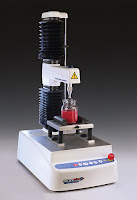STITCH TESTS
Stitched seams play an important role in clothing, upholstery and footwear, as they affect both structural integrity and appearance. Some seams contain reinforcements, providing support in areas of high stress, or to strengthen a weak upper material that might have been chosen for fashion purposes.
If a poor seam strength is reported in a stitch tear test, it can be used to recommend improvements in construction by examining how the seam failed. For example, thread density, size and type of thread, needle type/ size, and seam allowance may be adjusted.

Illustration of a stitch test – parallel to stitches
Stitch Tear Resistance – Parallel to Stitches

Example leather standard: ISO 23910.
In this method, a vertical slit is partially stitched. A metal rod is drawn upward to pull through the stitches. A Tensile Grip is required to support the sample for testing.

Illustration of a stitch test – perpendicular to stitches
Stitch Tear Resistance – Perpendicular to Stitches

Example upper or lining material standard: SATRA TM180.
In this method, a test specimen containing a stitched seam is gradually stretched by Tensile Grips in a direction perpendicular to the seam, until failure occurs. The breaking strength and type of breakdown are then determined.
The test specimens are prepared in a manner that allows the seam to continue beyond the area which is subjected to load during the test. This avoids the results from being influenced by the weakness introduced by cutting through the seam and stitching at the edge of the test specimen.

The Stitch Line Rig testing leather samples; illustration of test
Stitch Line Tear

Example upper or lining material standard: BS 5131.
This method is used for measurement of the strength of upper or lining material at the stitch line of footwear originating from either a single or multiple holes in the sample. The Stitch Line Rig enables a row of 17 needles to be pushed through the full thickness of the material and the maximum tensile force to pull needles through the material in a perpendicular direction to the row is measured. The maximum force is divided by the width of the sample to give the strength perpendicular to the needle perforations.
Read the next instalment Measuring the Mechanical Properties of Leather and Textiles –Compression and Penetration Tests on the blog next week.
There is a Texture Analysis test for virtually any physical property. Contact Stable Micro Systems today to learn more about our full range of solutions.
For more information on how to measure texture, please visit the Texture Analysis Properties section on our website.
No-one understands texture analysis like we do!
Get in touch to discuss your specific test requirements





No comments:
Post a Comment